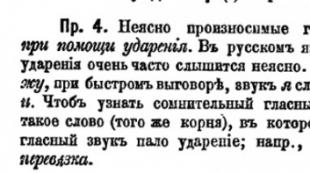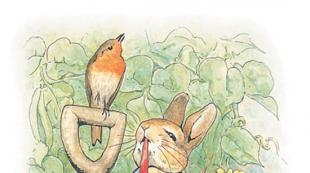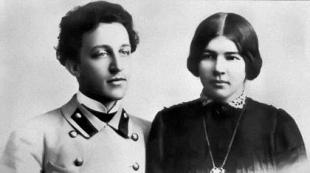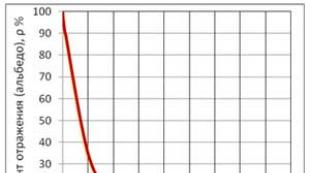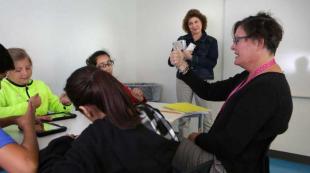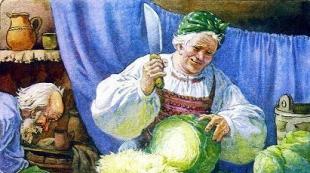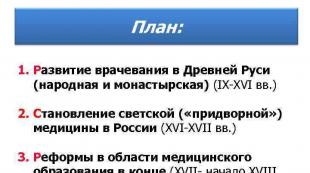Brief biography of A.A. Blok: the most important and basic information about the life and work of the poet. Brief biography of Alexander Blok Alexander Blok short message
Alexander Alexandrovich Blok was born on November 28, 1880 in St. Petersburg. His father was a lawyer, in addition to this he was a teacher at the University of Warsaw. Mother - Alexandra Beketova, was the daughter of the rector of one of the St. Petersburg universities. Soon after Alexander's birth, the parents broke off their relationship and the son began to live with his mother. Soon the mother remarried officer F.F. Kublitsky-Piottukha, the family began to live in the guards barracks.
In 1889 he began studying at the Vvedenskaya Gymnasium. When he went abroad in 1897 to one of the German resort towns, he experienced his first love for Ksenia Sadovskaya. A year later, after graduating from high school, he fell in love with Lyubov Mendeleeva, who later became his wife. Blok entered the Faculty of Law, but later changed his mind and began studying at the Faculty of History and Philology, from which he graduated in 1906.
The poet's literary path began in childhood. At the age of 10, young Blok began publishing his own handwritten magazines. From the age of 16 he attended a theater group, but he was practically not given roles. In 1901 he published his first collection of poems, “Poems about a Beautiful Lady,” which was written in the genre of symbolism. Over the years, his work evolved, and he began to raise such topics as human social life (“City” 1904-1908), religiosity (“Snow Mask” 1907), philosophy of life (“Scary World” 1908-1916), patriotism (“Motherland” ” 1907-1916)
After receiving higher education, Alexander Blok traveled abroad a lot, sometimes living there for months. It is characteristic that he spoke negatively about France and other European countries. The poet did not like the culture and customs of these countries.
The February and October revolutions had a significant impact on Blok's work and life. He had ambiguous thoughts about these events, but unlike other artists, he not only did not oppose the new government, but also supported it in every possible way, although later it seemed to him a mistake. The difficult financial situation and constant exhaustion negatively affected Blok’s health and he began to get sick. The new government, represented by the Politburo, refused to give permission to travel to Finland in order to begin treatment there. On August 7, 1921, Alexander Blok died from prolonged inflammation of the heart. Many famous personalities in Petrograd attended his funeral. In 1941, his ashes were again buried on the Literatorskie Mostki at the Volkovskoye cemetery.
Biography and creativity
In 1880, on November 28 (16), a son was born into the cultured St. Petersburg family of nobles Alexander Blok and Alexandra Beketova. The boy was named Sasha. Family happiness did not last long; the parents soon separated. Sasha's mother remarried and Blok grew up with his stepfather.
The family of the future poet spent the winter in his native St. Petersburg, and went to Shakhmatovo for the summer. The estate of Andrei Nikolaevich Beketov, Blok’s maternal grandfather, became for Sasha a window into the wonderful world of Russian nature.
The boy rode horseback, spent hours in the garden and happily tinkered with various domestic animals. Thus, from early childhood, Sasha learned to feel and love his native land.
The first experience of versification took place at the age of five. And at the age of nine, Blok entered the gymnasium. From an early age, Sasha, who was partial to reading, became interested in publishing. Ten-year-old Blok published a couple of issues of the handwritten magazine “Ship”, and at the age of 14, together with his brothers, he published “Vestnik”.
In 1898, after finishing his studies at the gymnasium, Alexander decides to devote his life to the study of law. But, after studying law for three years at St. Petersburg University, he became interested in ancient philosophy and moved to the Faculty of History and Philology.
Blok met the beginning of the twentieth century in the creative circle of the brightest writers of our time. Fet, Solovyov, Merezhkovsky, Gippius, Bryusov accepted the twenty-year-old talented young man into the arms of cultural St. Petersburg.
Blok became passionately interested in Russian symbolism. The first poems were published by the publishing house “New Way”; later the poet’s works were published in the almanac “Northern Flowers”.
The Beketovs' neighbors were the Mendeleevs. The daughter of the great chemist, Lyubov Dmitrievna, became for the poet not only his beloved girl, but also his muse. In 1903, Mendeleeva became his wife.
Blok is at the very beginning of his amazing creativity. In the same year, his poetic cycle “Poems about a Beautiful Lady”, dedicated to his wife, was published. The poet, filled with love, imagines a woman as a wonderful spring of light and purity, admiring the great power of true love, capable of uniting the whole world in one person.
The events of 1905-1907 and the First World War pressed the poet’s lyrical mood. Blok thought about the problems of society; he was concerned about the embodiment of the theme of the creator against the backdrop of existing reality. In the poet’s work, the homeland is like a loving wife, which is why patriotism acquired individuality and depth.
The year 1909 became tragic for the Blok family. The father and newborn child of Alexander Alexandrovich and Lyubov Dmitrievna died. At the same time, the poet conceived the poem “Retribution,” the work on which was never completed.
What was happening in Russia gloomily echoed the poet’s personal experiences, but Blok sincerely believed in the bright future of his native country.
1916 became the year of military service for the poet. He did not take part in hostilities; he served as a timekeeper.
Blok met the 1917 revolution with hope for changes for the better. The inspiration lasted for at most a year, presenting the public in 1918 with the controversial poem “The Twelve,” the article “Intellectuals and Revolution” and the poem “Scythians.”
With these works, the poet showed that he accepted Bolshevik Russia and was ready to live and work in a renewed country.
This allowed the new government to fully exploit the name of the famous poet. The poet no longer belonged to himself.
Heart pain, asthma, and nervous disorders became constant companions of the poet, who was loaded with everyday hardships, financial problems and constant work.
Blok tried to obtain permission to travel to Finland to rest and improve his health, especially since in 1920 he fell ill with scurvy.
Gorky, Lunacharsky and Kamenev asked for the poet. But the application was approved too late. On August 7, 1921, Alexander Blok passed away.
Very briefly by date
On November 16, 1880, the writer was born in the city of St. Petersburg. Born into a cultured family of a professor and writer.
In 1889 he was sent to a gymnasium and graduated in 1898.
Blok also graduated from the Institute of Law and History and Philology.
Blok began writing his first poems at the age of five. As a teenager, he was involved in acting.
At the age of 23 he married the daughter of the scientist Mendeleev, L.D. Mendeleeva. There was a quarrel with Andrei Bely over Mrs. Mendeleeva.
In 1904, a collection of poems by Alexander Blok was published and it was called “poems about a beautiful lady.”
A few years later, Blok and his wife managed to relax in Spain and Germany.
During the period of his creative activity, he was accepted by the “academy” society. Where were the wealthy, future famous creative figures?
Blok’s most famous work is “Night, Street, Lantern, Pharmacy.”
The dawn of the writer came in 1912-1914. The block mostly did not travel. During this time he worked in a publishing house.
The block was very sick. He was not allowed to go abroad for treatment. So in the end, in poverty and hunger, the writer died in 1921 from heart disease.
Biography by dates and interesting facts. The most important.
Other biographies:
- Igor Vasilievich Kurchatov
Igor Kurchatov is a Soviet physicist who created the foundations of nuclear energy and invented the first atomic bomb in the USSR. Igor Vasilyevich Kurchatov was born on February 21, 1903 in the Simsky Plant.
- Alexander the Great
Alexander the Great is an outstanding figure in history, commander, king, creator of a world power. Born in 356 BC in the Macedonian capital. Belongs to the family of the mythical hero Hercules
- Victor Vasnetsov
Viktor Vasnetsov was born on May 15, 1848 in the family of a parish priest. Born in the outback of the Vyatka province in the village of Lopyal, Victor could also become a priest and graduated from a theological seminary
- Jean-Paul Marat
Jean-Paul Marat was one of the most famous figures and ideologists of the French Revolution of the late 18th century. He was born on May 24, 1743 in Boudry in the family of a physician. J.-P. Marat also received an excellent medical education.
- Marshak Samuil Yakovlevich
Samuil Yakovlevich Marshak is a Russian poet, playwright, translator, literary critic, screenwriter, and author of popular children's books. Born in 1887 on October 22 in the city of Voronezh, in the family of a self-taught master, gifted chemist Yakov Mironovich Marshak
He amazed everyone with his irrepressible faith in the future of Russia and its people. Loving and suffering to embrace the immensity, a man with a wide soul and a tragic life. Blok's life and work deserve attention for their completeness and touchingness.
Biography of the poet
Blok Alexander Alexandrovich, born 1880, November 28. Place of birth - St. Petersburg. His parents: father - A.L. Blok, worked as a lawyer at the university in Warsaw, mother - A.A. Beketova, daughter of the famous botanist.
The boy's parents divorced before he was born, so he did not grow up in a complete family. However, maternal grandfather A.N. Beketov, in whose family Alexander grew up, surrounded the child with due care and attention. Gave him a good education and a start in life. A.N. himself Beketov was the rector of the university in St. Petersburg. The highly moral and cultural atmosphere of the environment left its mark on the formation of Blok’s worldviews and upbringing.
Since childhood, he has had a love for the classics of Russian literature. Pushkin, Apukhtin, Zhukovsky, Fet, Grigoriev - these are the names on whose works little Blok grew up and became familiar with the world of literature and poetry.
Poet's training
The first stage of education for Blok was a gymnasium in St. Petersburg. After graduating in 1898, he entered St. Petersburg University to study law. He completed his legal studies in 1901 and changed his direction to historical and philological.
It was at the university that he finally decided to delve into the world of literature. This desire is also reinforced by the beautiful and picturesque nature, among which his grandfather’s estate is located. Having grown up in such an environment, Alexander forever absorbed the sensitivity and subtlety of his worldview, and reflected this in his poems. From then on, Blok’s creativity began.
Blok maintains a very warm relationship with his mother; his love and respect for her is limitless. Until his mother’s death, he constantly sent her his works.
Appearance

Their marriage took place in 1903. Family life was ambiguous and difficult. Mendeleev was waiting for great love, as in novels. The block offered moderation and tranquility of life. The result was his wife’s passion for his friend and like-minded person, Andrei Bely, a symbolist poet who played an important role in the work of Blok himself.
Lifetime work
Blok’s life and work developed in such a way that, in addition to literature, he took part in completely everyday affairs. For example:
"Poems about a Beautiful Lady";
"Unexpected joy";
"Snowy Night"
"On the Kulikovo field."
“Retribution”, which he wrote like that.
was an active participant in dramatic productions in the theater and even saw himself as an actor, but the literary field attracted him more;
for two years in a row (1905-1906) the poet was a direct witness and participant in revolutionary rallies and demonstrations;
writes his own literature review column in the newspaper "Golden Fleece";
from 1916-1917 repays his debt to the Motherland, serving near Pinsk (engineering and construction squad);
is part of the leadership of the Bolshoi;
upon returning from the army, he gets a job in the Extraordinary Investigative Commission for the Affairs of Tsarist Ministers. He worked there as a shorthand report editor until 1921.
Blok's early work
Little Sasha wrote his first poem at the age of five. Even then, he had the makings of a talent that needed to be developed. This is what Blok did.
Love and Russia are two favorite themes of creativity. Blok wrote a lot about both. However, at the initial stage of development and realization of his talent, what attracted him most was love. The image of the beautiful lady, which he had been looking for everywhere, captured his entire being. And he found the earthly embodiment of his ideas in Lyubov Mendeleeva.
The theme of love in Blok’s work is revealed so fully, clearly and beautifully that it is difficult to dispute it. Therefore, it is not surprising that his first brainchild - a collection of poems - is called "Poems about a Beautiful Lady", and it is dedicated to his wife. When writing this collection of poems, Blok was greatly influenced by the poetry of Solovyov, whose student and follower he is considered to be.
In all poems there is a feeling of Eternal femininity, beauty, and naturalness. However, all expressions and phrases used in writing are allegorical and unrealistic. Blok is carried away in a creative impulse to “other worlds.”

Gradually, the theme of love in Blok’s work gives way to more real and pressing problems surrounding the poet.
The beginning of disappointment
Revolutionary events, discord in family relationships, and miserably failing dreams of a clean and bright future for Russia force Blok’s work to undergo obvious changes. His next collection is called “Unexpected Joy” (1906).
More and more he ridicules the Symbolists, to whom he no longer considers himself, and he becomes more and more cynical about hopes for the best ahead. He is a participant in revolutionary events, who is completely on the side of the Bolsheviks, considering their cause to be right.
During this period (1906) his trilogy of dramas was published. First, “Balaganchik”, after some time “King in the Square”, and this trio ends with bitter disappointment from the imperfection of the world, from their disappointed hopes. During the same period, he became interested in actress N.N. Volokhova. However, he does not receive reciprocity, which adds bitterness, irony and skepticism to his poems.
Andrei Bely and other previously like-minded people in poetry do not accept the changes in Blok and criticize his current work. Alexander Blok remains adamant. He is disappointed and deeply saddened.
"The Incarnation Trilogy"
In 1909, Blok’s father dies, to whom he does not have time to say goodbye. This leaves an even greater imprint on his state of mind, and he decides to combine his most striking works, in his opinion, into one poetic trilogy, which he gives the name “Trilogy of Incarnation.”
Thus, Blok’s work in 1911-1912 was marked by the appearance of three collections of poems, which bear poetic titles:
A year later, he released a cycle of love poems “Carmen”, wrote the poem “The Nightingale Garden”, dedicated to his new hobby - singer L.A. Delmas.
Homeland in Blok's works

Since 1908, the poet has positioned himself no longer as a lyricist, but as a glorifier of his Motherland. During this period he writes poems such as:
"Autumn Wave";
"Autumn Love";
All these works are imbued with love for the Motherland, for one’s country. The poet simultaneously shows two sides of life in Russia: poverty and hunger, piety, but at the same time wildness, unbridledness and freedom.
The theme of Russia in Blok’s work, the theme of the homeland, is one of the most fundamental in his entire poetic life. For him, the Motherland is something living, breathing and feeling. Therefore, the ongoing events of the October Revolution are too difficult, disproportionately difficult for him.
The theme of Russia in Blok’s works
After revolutionary trends capture his entire spirit, the poet almost completely loses lyricism and love in his works. Now the whole meaning of his works is directed towards Russia, his homeland.
Blok personifies his country in poetry with a woman; he makes it almost tangible, real, as if he humanizes it. The homeland in Blok’s work takes on such a large-scale significance that he never writes about love again.
Believing in the Bolsheviks and their truth, he experiences severe, almost fatal disappointment for him when he sees the results of the revolution. Hunger, poverty, defeat, mass extermination of the intelligentsia - all this forms in Blok’s mind an acute hostility towards the symbolists, towards lyricism and forces him from now on to create works only with a satiristic, poisonous mockery of faith in the future.
However, his love for Russia is so great that he continues to believe in the strength of his country. That she will rise up, dust herself off and be able to show her power and glory. The works of Blok, Mayakovsky, Yesenin are similar in this regard.
In 1918, Blok wrote the poem “The Twelve,” the most scandalous and loud of all his works, which caused a lot of rumors and conversations about it. But criticism leaves the poet indifferent; the emerging depression begins to consume his entire being.
Poem "Twelve"
The author began writing his work "The Twelve" in early January. On the first day of work, he didn't even take a break. His notes say: “Trembling inside.” Then the writing of the poem stopped, and the poet managed to finish it only on January 28.
After the publication of this work, Blok’s work changed dramatically. This can be briefly described as follows: the poet lost himself, stagnation set in.
The main idea of the poem was recognized differently by everyone. Some saw in it support for the revolution, a mockery of symbolist views. Some, on the contrary, have a satirical slant and mockery of the revolutionary order. However, Blok himself had both in mind when creating the poem. She is contradictory, just like his mood at that moment.

After the publication of “The Twelve,” all already weak ties with the Symbolists were severed. Almost all of Blok’s close friends turned away from him: Merezhkovsky, Vyach, Prishvin, Sologub, Piast, Akhmatova and others.
By that time, he himself was becoming disillusioned with Balmont. Thus, Blok is left practically alone.
Post-revolutionary creativity
The revolution passed, and the bitterness from the disappointment of the Bolshevik policies grew and intensified. Such a gap between what was promised and what was done as a result of the revolution became unbearable for Blok. We can briefly characterize Blok’s work during this period: nothing was written.
As they would later write about the poet’s death, “the Bolsheviks killed him.” And indeed it is. Blok was unable to overcome and accept such a discrepancy between the word and deed of the new government. He failed to forgive himself for supporting the Bolsheviks, for his blindness and short-sightedness.
Blok is experiencing severe discord within himself and is completely lost in his inner experiences and torment. The consequence of this is illness. From April 1921 to the beginning of August, the illness did not let go of the poet, tormenting him more and more. Only occasionally emerging from semi-oblivion, he tries to console his wife, Lyubov Mendeleeva (Blok). On August 7, Blok died.

Where did the poet live and work?
Today, Blok’s biography and work captivate and inspire many. And the place where he lived and wrote his poems and poems turned into a museum. From the photographs we can judge the environment in which the poet worked.
You can see the appearance of the estate where the poet spent time in the photo on the left.
The room in which the poet spent the last bitter and difficult moments of his life (photo below).

Today, the poet’s work is loved and studied, admired, his depth and integrity, unusualness and brightness are recognized. Russia in Blok’s works is studied in school classes, and essays are written on this topic. This gives every right to call the author a great poet. In the past, he was a symbolist, then a revolutionary, and at the end of the day he was simply a deeply disillusioned person with life and power, an unhappy person with a bitter, difficult fate.
A monument has been erected in St. Petersburg to perpetuate the author’s name in history and pay due respect to his undeniable talent.
Blok was the idol of the young Russian intelligentsia in the second decade of the 20th century. He is the greatest poet of Russia of the era of symbolism. Within this artistic movement he represents the second generation. His early work shows the influence of romantic poetry, such as Zhukovsky and Lermontov, and pure poetry, such as Polonsky and Fet.
Poems about a Beautiful Lady bear the stamp of the sophiology of Vladimir Solovyov and the mysticism of the St. Petersburg symbolists. In mystically sublime tones, Blok speaks of the Beautiful Lady as Sophia the Wisdom of God and the Virgin Mary. “Desired Friend”, “Queen of Purity”, “Mysterious Maiden” - images of the eternally feminine.
Block. Lyrics. Second volume. Video tutorial
Next book of poems Unexpected joy(1906), named after the icon of the Mother of God of the same name, highlights a layer of religious veneration of femininity, but still retains an ambivalent attitude towards the demonism of eros.
Poem Stranger(1906, see full text and analysis) from the series City, written in 1901-1908, when Blok, following Bryusov, turns to the phenomenon of human existence in big cities, gives a fusion of otherworldly and earthly features in the image of a city lady and a street prostitute. This is already the path to the cycle Snow mask, whose impact is determined by the dynamic deployment and crossing of bold metaphors.
Blok is a poet of momentary, real and visionary impressions that give rise to a multi-colored figurative fabric, flowing from a musically holistic perception of the world.
Play Showcase reduces all allegories of the eternally feminine to the comically banal, reflecting both internal contradictions and a game that destroys illusions. This little drama and two others - King in the square (1906), Stranger(1906) - Blok combined it into a trilogy.
Among Blok's later lyrics, the poems addressed to Russia, which at the beginning of the First World War were published in the collection Poems about Russia(1915). Romantic-symbolist drama arose from a passion for French medieval poetry. Rose and Cross(1913), another attempt at a debate with the realism of Blok’s contemporary theater, moreover, built on the constant intersection of historical and imaginary layers. During the war, Blok sought to stage this drama in the theater, but in vain.
Poem Twelve(see its full text and analysis), consisting of twelve rhythmically and plot-independent parts, unfolds to the march of twelve Red Army soldiers through Petrograd. Here the farewell to the old world, the chaos of the revolution and the spells of the future are brought together. At the end of the poem, Christ appears at the head of this revolutionary march, under a red banner and crowned with white roses.
The day after graduation Twelve Blok wrote a poem Scythians(cm.
He is rightfully considered one of the famous poets and classics of Russian literature. He lived in an interesting time, rich in historical events. The life of this man was full of interesting events and vivid impressions, which was reflected in his work. Let's take a closer look at this extraordinary personality, a true representative of the Russian intelligentsia and one of the best writers of his time.
Alexander Alexandrovich Blok was born in 1880, on November 16 in the capital of the Russian Empire, St. Petersburg. The family of the future poet was from the old Russian intelligentsia - his father was a professor, his mother a translator. The parents' marriage broke up even before the birth of their son, and Alexander was raised by his grandfather A. Beketov (he was the rector of the university). Therefore, most of Blok’s childhood memories are connected precisely with their family estate in Shakhmatovo, where the boy spent his annual summer holidays. Alexander's passion for literature manifested itself in early childhood, when at the age of five he began to compose his first poems.
Blok's mother, after a divorce, remarried in 1889. (her chosen one was a guards officer). In the same year, Alexander was assigned to study at the gymnasium. After its graduation in 1898. the young man entered the university with the firm conviction of becoming a lawyer. But after studying for three years, he realized that jurisprudence was definitely not for him. Therefore, the young man chose a different path and transferred to the Faculty of History and Philology, which he graduated successfully in 1906.
While still a student, in 1900. the future poet met the then famous symbolists D. Merezhkovsky, Z. Gippius, A. Bely, V. Bryusov. At the same time, the young man’s poetic talent blossoms. In 1903 A significant event took place in Blok’s life - his marriage to Lyubov Mendeleeva, the daughter of the famous Russian chemist D. Mendeleev. And already in 1904. The book "Poems about a Beautiful Lady" was published.
Occurred in 1905. the revolution played a significant role in the formation of the poet’s new worldview. The nature of the poet’s creativity also changes. The romantic beautiful lady is replaced by a rebellious stranger. At this time, Blok’s writings were permeated with motifs of rebellion; images of unbridled elements, blizzards, occupied a central place in his poems. In 1907 Blok publishes his collections of poems “Snow Mask”, “Unexpected Joy”, “Earth in the Snow”. In 1908 the poet turns to the theater and writes dramas “Stranger”, “Balaganchik”, etc. He gains fame and becomes a successful writer.
In the spring of 1909 A. Blok and his wife go on vacation abroad. They visited Italy and visited Germany. The time of this interesting journey for the poet becomes a kind of stage of reassessment of values. As a result of the trip, the collection “Italian Poems” was published. At the end of 1909 Alexander receives an inheritance from his father, which allowed the poet to temporarily not think about literary earnings and concentrate on working on major works. 1911 was marked by the publication of the collection “Night Hours”. And in 1912-13. The play "Rose and Cross" was written.
In July 1916 the poet was drafted into the army. In 1917, after the February Revolution, he returned to Petrograd and worked as part of an investigative commission that investigated the crimes of tsarism. The results of this work are reflected in the documentary collection “The Last Days of Imperial Power.” And already the next October revolution of 1917. caused a new rise in Blok's creativity. He wrote the famous poems “Scythians” and “The Twelve”.
But at the same time, the writer also sees a discrepancy between his ideas about a new life and the approaching totalitarian regime, where there is no place for the freedom of the artist. All this puts the poet into a state of depression, and he is diagnosed with heart disease. Blok's request to travel abroad for treatment was rejected by the new government. And in 1921, on August 7, the poet died.
E. A. Dudukalova,
teacher of Russian language and literature
MOAU "Secondary School No. 22" Novotroitsk
SUBJECT NAME: Literature
CLASS:11
UMK: "Russian literature of the twentieth century. 11th grade" (parts 1,2) for general education
institutions (authors - V.P. Zhuravlev et al., M. "Prosveshchenie", 2005).
LEVEL OF TRAINING: basic
LESSON TOPIC: Alexander Blok: fate and creativity.
Themes and images of early lyrics. "POEMS ABOUT A BEAUTIFUL LADY".
TYPE OF LESSON: lesson on learning new material
OBJECTIVE OF THE LESSON: developing interest in the personality of the poet; expanding your reading range
eleventh graders; development of mental partial search
cognitive activity
LESSON OBJECTIVES:
educational: to introduce the main stages of the life and work of A.A. Blok;
note the originality of the poetic world of the early Blok, the manifestation of his creativity in
symbolism; consider the main themes and images of the first collection "Poems about the Beautiful
Lady."
educational: to cultivate in students a love for the poetic word
developmental: promote the formation of consistent, logical
thinking, speaking and writing.
EQUIPMENT: multimedia presentation, multimedia projector, computer,
portraits of A. Blok
METHODOLOGICAL TECHNIQUES: reproductive, illustrative, research.
FORMS OF WORK: lecture with elements of conversation, viewing of presentation, fragments from
TYPES OF WORK: individual (implementation of individual homework);
film, expressive reading of poetry and their brief analysis.
collective.
LESSON PROGRESS (SLIDE 1)
Like a monument to the beginning of the century,
This man is standing here...
A. Akhmatova
I. Organizational moment
Greetings.
II. Creating an emotional mood
Listening to an audio recording.
"Night. Street. Lantern. Pharmacy."
III. Teacher's word:
Turn of the century. Early 20th century...
Remember what Russia is going through at this time? What did you learn about this from
previous lessons?
Listening to students' answers
This is how A. Blok will say about this time and the generation of those years...
Those born in the year are deaf
They don’t remember their own paths.

We are children of the terrible years of Russia
I can't forget anything.
Sizzling years!
Is there madness in you, is there hope?
From the days of war, from the days of freedom
There is a bloody glow in the faces.
...Alexander Alexandrovich Blok is perhaps the most brilliant and unique poet
"Silver Age", which became a legend during his lifetime. A poet who with his creativity
completed the poetic quest of the 19th century and opened the way for the poetry of the new century, combining in his
creativity Russian classics and new art. A lot was written about him and people revered him
different political parties, beliefs, representatives of different literary movements.
For example, M. Gorky’s statement about Blok is known: “Believe Blok. This is real,
by the will of God - a poet and a man of fearless sincerity..." Anna Akhmatova called him
"tragic tenor of the era."
What do you know about this poet? What poems did you read? How do you understand the words?
A. Akhmatova, taken as an epigraph to the lesson? (listen to the students' answers). (SLIDE 2)
And in our time, A. Blok’s legacy does not lose its significance. This is what the doctor writes
Philological Sciences Professor L.F. Alekseeva: “Again, as in the 1910-1920s,
stands out against the diverse and colorful background of the literature of these historical
decades, the poetic voice of Alexander Blok. It contains not only the utmost
sincerity, that is, the reliability of the feelings and moods of a specific extraordinary
personality, a witness of the era, perceiving it with all the strength of the soul, but also a deep
a presentiment of the perspective of history, the ability to hear in the sounds of modernity
voices of the future."
What is the attractiveness of A. Blok’s poetry, what is its originality? Today we
these questions remain to be answered.
So, write down the topic of the lesson in your notebook: “Alexander Alexandrovich Blok. Life and
creation. Block and symbolism. Themes and images of early lyrics. "Poems about a beautiful lady."
I ask you to take the necessary notes during the lesson.
Let us turn to the origins of the poet’s work. Let's get acquainted with the sketch of the poet's life.
Student message (SLIDE 38)
November 16 (November 28), 1880 Alexander Blok was born and raised in
highly cultured noble-intellectual family. His father, Alexander Lvovich, led
descended from the doctor Johann von Block, who came to Russia in the middle of the 18th century from
Mecklenburg, and was a professor at the University of Warsaw in the department
state law. According to his son, he was a capable musician, an expert
literature and a subtle stylist. However, his despotic character became the reason
the fact that the mother of the future poet, Alexandra Andreevna, writer, translator, was
forced to leave her husband. So in 1881 A.L. The block returns to Warsaw, and A.A.
BeketovaBlok remains in St. Petersburg in the house of his father, Andrei Nikolaevich
Beketov, famous botanist, public figure, rector of St.
St. Petersburg University. In the Beketov family, many were involved in literary
labor. Blok’s grandfather was the author not only of solid works, but also of many scientific
popular essays. Grandmother, Elizaveta Grigorievna, studied all her life
translations of scientific and artistic works. "The list of her works is enormous,"
the grandson later recalled. Literary work was systematically carried out and
daughters are Blok's mother and his aunts.
The atmosphere of literary interests aroused in him very early
becomes an "editor-publisher"
an irresistible craving for poetry.
home handwritten magazine "Vestnik", prepares translations, parodies, reviews,
In 1894

poetic and prose experiments, attracts cousins and
second cousins. In 1894-1897, high school student Blok published 37 issues
magazine. “Then I was captivated by his (Blok’s) love for literary techniques.
and special accuracy,” recalled Sergei Solovyov, Blok’s cousin, future poet
Young Symbolist.
In his youth, Alexander Blok dreamed of becoming an actor, practiced recitation,
took part in amateur performances.
On August 1, 1898, while visiting the neighboring Mendeleev estate Boblovo (where
met his future wife, daughter (of the great Russian chemist Dmitry
Ivanovich Mendeleev, Any), played in scenes from Shakespeare's tragedy "Hamlet". Role
Hamlet was played by Blok, the role of Ophelia by Lyubov Mendeleeva. This is how the story began
love. (SLIDE 9)
Expressive reading of the poem "We met you at sunset"
View stills from the film Poems about a Beautiful Lady (1972) (appendix)
Teacher's word
The love story of Blok and Mendeleeva was not serene. There were also misunderstandings
and relationship breakdowns. But L.D. Mendeleev will remain his poetic Muse for the rest of his life.
In 1898, Blok became a student at the Faculty of Law of St. Petersburg
university, but is soon transferred to the historical and philological ft. In the same year he
begins to write poetry, which will later be included in the collection "Poems about a Beautiful Lady".
(SLIDE 1011) In 1903, in the book “Northern Flowers. The Third Almanac of Book Publishing
"Scorpio" published a cycle of 10 poems "Poems about a Beautiful Lady".
Blok's literary debut took place. These are the lyrics of love and nature, full of obscure
premonitions, mysterious hints, allegories. Young Blok immerses himself in study
idealistic philosophy, in particular the works of the ancient Greek philosopher Plato,
who taught that in addition to the real world, there is also a certain “superreal”, higher “world of ideas”.
He was overcome, by his own admission, with acute mystical experiences,
restless and uncertain excitement. He began to see in nature and in the environment
In reality, there are some “signs” that are incomprehensible to him, but disturbing the soul.
Such feelings were typical for a whole circle of young people of that time,
fell under the influence of ancient and new idealistic and religious-mystical
philosophy.
Poems and philosophical
works by Vladimir Solovyov.(SLIDE15)
Questions for students:
What do you know about Vladimir Solovyov?
Remember what symbolism is?
Which literary movement did A. Blok belong to?
Name the main features of symbolism.
The book "Poems about a Beautiful Lady" was published in October 1904 by the Grif publishing house.
(93 poems). .(SLIDE13)
1. Why do you think the poet named his collection of poems that way? Which
What associations do you have when you hear: “Poems about a Beautiful Lady”?
2. What word could be added?
3. Who elected the Ladies of the Heart and at what times?

The cycle "Poems about a Beautiful Lady" was inspired by Lyubov Dmitrievna
Mendeleeva. The poems that formed the core of A. Blok’s first book of lyrics were written at the time
the poet's most ardent and tender love. In his diary of 1919, Blok wrote: “... when I
carried within me a great flame of love." This book is the true beginning, the source of all creativity
A. Blok. .(SLIDE14)
In March 1908, the poet wrote: “Poems about a Beautiful Lady” - early morning dawn, those
dreams and fogs with which the soul fights in order to gain the right to life. Loneliness,
darkness, silence - a closed book of existence that captivates with its inaccessibility.... Everybody there
the future is sealed. In the morning darkness the enchanting One Face is already visible,
who visited in visions over fields and cities...."
Beautiful Lady - “Queen of Purity”, “Evening Star” the focus of everything Eternal
and Heavenly. .(SLIDE1516)
The traditional romantic theme of love and service received in "Poems about
To the Beautiful Lady" the new meaningful content that was brought to her
ideas of Vl. Solovyov about merging with the Eternal Feminine in the Divine All-Unity, about
overcoming the alienation of the individual from the world as a whole through a feeling of love. Myth about
Sophia, becoming the theme of lyrical poems, transforms beyond recognition into
the inner world of the cycle, traditional natural, and in particular, “lunar” symbolism and
paraphernalia (the heroine appears above, in the evening sky, she is white, source
light, scatters pearls, floats up, disappears after sunrise, etc.). Let's consider
more poems from this cycle.
Let us turn to one of the poems “I Enter Dark Temples” (1901)
(reading by heart by a trained student).
1. What is the emotional atmosphere of the poem? What's the mood of this
works?
2. How does the lyrical hero of the poem appear? What is his inner
state?
3. Is the appearance of the Beautiful Lady drawn? Can we highlight
specific, earthly features of the heroine’s appearance?
4. What does the lyrical hero call the one to whom he dedicates this poem?
Expressive reading of the poem “I have a presentiment of you. Years pass
by." (1902)
1. What new appears in the psychological state of the lyrical hero of this
poems?
2. What do you think explains the hero’s fear?
1. Let’s draw conclusions: What evolution does the image of the Beautiful Lady undergo? (answers
students)
At the beginning, the Beautiful Lady is the bearer of the Divine Principle, the Eternal
Femininity. In the poem "I enter dark temples" the motif sounds
optimistic expectation of the Beautiful Lady, whose image merges with the image
Our Lady. The Beautiful Lady is a “dream”, a dream, an ideal, she is unattainable. The hero is fascinated and
trembling in anticipation of the meeting. Gradually, the image of the Lady decreases, becomes earthly,
takes on real features. In the poem "I have a presentiment of you. The years pass by"
The hero's dream is pure, clear and beautiful, it is close. The hero lives in anticipation, anticipation
Her appearance. A motive of melancholy, fear, and anxiety appears. The poet is afraid that Her "habitual
his features will suddenly change, he will not recognize his ideal, and his dreams will turn out to be just a dream.(
SLIDE 1416)
2. How does A. Blok depict the feeling of love?

Love is depicted by Blok as a rite of service to something higher. fictional world
contrasted with the events of reality.
3.What is unique about A. Blok’s early lyrics? (.(SLIDE 17)
The main features of Blok’s symbolist lyrics are:
Musicality;
Sublimity of the subject matter;
Polysemy;
Mystical mood;
Understatement;
Vagueness of images
Teacher's word
The events of the revolution played a special role in shaping Blok’s worldview.
1905-1907, revealing the spontaneous, catastrophic nature of existence. Into the lyrics of this
time, the theme of “the elements” penetrates and becomes the leading one (images of blizzards, blizzards, motifs
free people, vagrancy). The image of the central character changes dramatically:
The Beautiful Lady is replaced by the demonic Stranger, Snow Mask, and Gypsy
schismatic Faina. Blok is actively involved in literary everyday life,
published in all symbolist magazines.
In 1907, Blok, unexpectedly for his fellow Symbolists, showed interest and
closeness to the traditions of democratic literature. The problem of "the people and the intelligentsia"
key for the creativity of this period, determines the sound of all themes developed in his
articles and poems: the crisis of individualism, the place of the artist in the modern world, etc. His
poems about Russia, in particular the cycle “On the Kulikovo Field,” combine images of the homeland and
beloved (reading the poem “The river spread out...”).
After the February revolution, Blok increasingly doubted
the bourgeois republican regime established in the country, since it did not bring
As the people get rid of the criminally unleashed war, Blok is increasingly worried about his fate
revolution, and he begins to listen more and more carefully to the slogans of the Bolsheviks. They
They captivate him with their clarity: peace to the peoples, land to the peasants, power to the Soviets.
Shortly before October, Blok admitted in a conversation: “Yes, if you want, I would rather
Bolsheviks, they demand peace..."
A. Blok's poem "The Twelve" was written in 1918. It was a terrible time:
four years of war are behind us, a feeling of freedom in the days of the February Revolution, October
coup and the coming to power of the Bolsheviks, finally, the dispersal of the Constituent Assembly,
the first Russian parliament.
A. Blok very accurately felt the terrible thing that came into life: complete depreciation
Following "The Twelve" the poem "Scythians" was written.
Contrasting the "civilized" West and revolutionary Rus', the poet on behalf of
revolutionary "Scythian" Russia calls on the peoples of Europe to put an end to the "horrors"
war" and sheathe the "old sword." The poem ends with a call for unity
(SLIDE 2022)
For the last time - come to your senses, old world!
To the fraternal feast of labor and peace,
For the last time at the bright fraternal feast
The barbaric lyre is calling!
In Russian history, A. Blok saw the key to future success and the rise of the country.
Russia Sphinx. Rejoicing and mourning,

And dripping with black blood,
She looks, looks, looks at you,
Both with hatred and with love!
Thus ended the “trilogy of incarnation.” Thus ended the poet’s difficult journey,
a path filled with great artistic discoveries and achievements. (SLIDE 2324)
In the last years of his life 1918 1921 Blok, like a poet, falls silent. Works a lot in
cultural institutions created by the new government. Writes articles "Intellectuals and
revolution" (1918), "The Collapse of Humanism" (1919), the poem "Without God, without
inspiration" (1921), "On the purpose of the poet" (1921). In the last poem"
Pushkin House" showed the poet's disappointment in what was happening.
What fiery distances
The river opened up to us!
But these are not the days we called,
And the coming centuries.
Pushkin! Secret freedom
We sang after you!
Give us your hand in bad weather,
Help in the silent struggle!
In the spring of 1921, Blok fell mortally ill. He cannot travel abroad for treatment.
allowed. On August 7 he died. The cause of death remained unknown. Shortly before death
A. Blok wrote: “The poet dies because he can no longer breathe.” Finish lesson
I would like to read the lines of A. Akhmatova’s poem dedicated to A. Blok.
He's right - again a lantern, a pharmacy,
Neva, silence, granite...
Like a monument to the beginning of the century,
This man is standing there
When he goes to the Pushkin House,
Saying goodbye, he waved his hand
And accepted mortal languor
Like undeserved peace.
D/z:
1. Biography of the poet;
2. Using the material from the lecture and article in the textbook on p. 159162, tell me what
features of Blok’s early work and poems from the cycle “Poems about a Beautiful Lady”;
3. Read the article (p. 162166 of the textbook) and answer the question, what is the content and
the mood penetrates into Blok's work in 1905-1908";
4. Expressive reading of poems: “Stranger”, “In a restaurant”, “Factory”.
